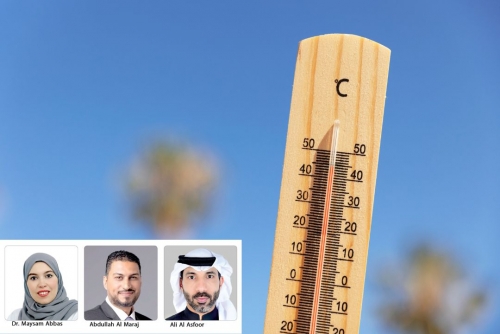Labour Unions Call for Expansion of Bahrain's Heatstroke Protection Law
TDT | Manama
The Daily Tribune - www.newsofbahrain.com
Labour unions in Bahrain are calling for the inclusion of certain professions in the annual midday work ban, which is set to come into effect on Monday, 1st July. The ban, which runs from 1st July to 31st August, aims to protect workers from extreme heat.
Union leaders have argued that professions like food delivery riders and petrol station workers, who spend extended periods outdoors under the sun, should be included in the ban. They point to similar measures taken in other regional countries, where motorcycle delivery riders are prohibited from working during midday hours.
"The current ban is clear: it prohibits work in areas where temperatures exceed the permissible level for normal work and are relatively hotter than usual," explained Abdullah Al Maraj, Vice President for Media and Public Relations at the Bahrain Free Labour Unions Federation. "However, this doesn't just apply to open spaces, as some believe, but to all hot work environments," he added.
Al Maraj called for a review of regulations concerning the working class, suggesting that the midday work ban be extended from mid-June to mid-September to better protect workers from heat exhaustion and heatstroke. He specifically emphasised the need to include delivery riders in the ban, citing their exposure to high temperatures and sunlight.
"We must implement the ban like our neighbouring countries, who have extended the midday work stoppage, and include motorcycle riders," Al Maraj stated.
Ali Al Asfoor, Assistant Secretary General for Occupational Health, Safety and Environment at the General Federation of Bahrain Trade Unions, echoed the call for expanding the ban's scope. He highlighted the need for a comprehensive national programme for occupational health and safety, aligning with the country's needs.
"Bahrain was a pioneer in enacting occupational health and safety laws in the 1970s," Al Asfoor noted. "These regulations have played a crucial role in creating a safe work environment. However, the rapid advancements in occupational health and safety require us to keep pace."
Al Asfoor urged for stricter supervision of sectors exempted from the ban, such as the oil and gas industry, while acknowledging its vital role and the need for continuous operations. He also emphasised the importance of including other professions affected by high temperatures, such as delivery riders and petrol station workers, and developing alternative plans to support these sectors without impacting productivity and services.
Dr. Maysam Ali Abbas, a family medicine specialist, highlighted the health risks associated with working in extreme heat. She explained that exposure to high temperatures and intense sunlight can lead to various health risks, ranging from mild heat cramps to severe heatstroke.
"Prolonged exposure to sunlight without protection can cause various skin changes, from sun sensitivity and discoloration to skin cancer," Dr. Abbas warned. "Certain autoimmune skin diseases, like lupus, can worsen with sun exposure. High temperatures can disrupt the body's electrolyte balance, affecting individuals with diabetes, liver disease, and adrenal gland disorders. Heart patients may experience complications due to significant fluid loss. There is also an increased risk of fungal skin infections."
Related Posts

